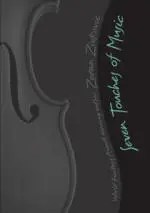 In Issue 6 (Summer 2007) of The Pacific Rim Review of Books, Bernard Gastel reviews Seven Touches of Music:
In Issue 6 (Summer 2007) of The Pacific Rim Review of Books, Bernard Gastel reviews Seven Touches of Music:
The central conceit seems to be that God is a violinist, a composer whose composition is suggestive of the entire world in its historical and future complexity. Characters are given glimpses of alternate or apparently lost parts of that composition, but, just as music described is no longer music, they do not have the means to share that glimpse with anyone else. Their impossible experiences would be considered signs of instability and nothing more. In the first story a teacher of autistic children finds that instead of filling a sheet of paper with nothing but the letter ‘O’ as he normally does, one of his students – apparently under the influence of music – writes a series of numbers. This series, it turns out, is a physical constant, one of the “fundamental values of nature.” There is nothing the teacher can do with this information, because there is no recurrance of this anomaly. All the characters in the book are confronted with a moment of divine clarity, and their choice, when possible, is invariably to return to the comfort or banality of everyday things.
In Seven Touches of Music ultimate truths have an ambiguous existence. It is exactly where those truths are revealed that loss is felt most profoundly. A short, beautiful book, it shows a world where the ideal, where it exists at all, is found in the world’s shadows as well as in its light.
And a very nice reader review on the Amazon.co.uk page for the book, by Mr. RB Fortune-Wood “Rowan”:
Nietzsche once claimed “Without music, life would be an error.” The nihilistic Romanian thinker Emil Cioran, heavily influenced by Nietzsche, said on God, “without Bach, God would be a complete second rate figure.” I cannot think of anything better than these two aphorisms to convey the impression the Serbian writer Zoran Zivkovic’s Seven Touches of Music made on me. Each narrative compliments the others forming a beautiful mosaic novel fittingly contained in an exquisite black cover. Seven Touches of Music is reminiscent of H.P. Lovecraft’s short story “The Music of Erich Zann,” which possesses a similar inexplicable pull.
 Julia Gaß at German site Schreib-Lust reviews Hidden Camera:
Julia Gaß at German site Schreib-Lust reviews Hidden Camera:






